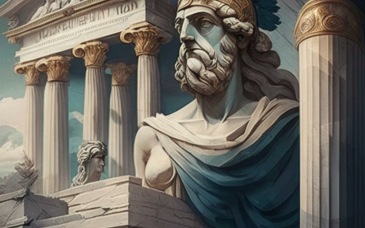(all dates B.C.)
circa 9000 Atlantis disappears.
circa 1600 Island of Thera explodes, causing a tidal wave that inundates coastal settlements in the Aegean, and cripples the civilization of Crete.
circa 1300 Theseus establishes the city of Athens.
circa 1250 Troy falls to Agamemnon and his Greek army after a ten-year siege.
circa 1200 Dorians set up states in the southern Peloponnesus, Crete, and Rhodes.
circa 800 Lycurgus institutes reforms in Sparta, compiles Homer's epics, the Iliad and the Odyssey.
776 First Olympiad.
730 Sparta conquers Messene.
594 Solon gives Athens a constitutional democracy, and wipes out all debts.
560-527 Tyranny of Pisistratus and his sons in Athens. Eventually this tyranny is ended by Cleisthenes.
490 Battle of Marathon. Athens defeats an invading army of Persians.
480 King Xerxes of Persia invades Greece, and overcomes the heroic resistance of a vastly outnumbered Spartan force at the Battle of Thermopylae. Athens is destroyed. At the Battle of Salamis, the Persian navy is defeated by the Greeks, so Xerxes decides to go home and leave the rest of the war to his lieutenant, Mardonius.
479 Battle of Plataea. The allied Greeks defeat the Persians under Mardonius, and the Persian invasion is practically over.
477 Athens assumes leadership of Delian League, which is an alliance of the city-states and islands of Greece against the Persians.
464 Earthquake in Sparta; helots revolt.
461 Cimon is ostracized from Athens.
454 The treasury of the Delian League is transferred to Athens.
443 Thucydides ostracized, leaving Pericles in total control of Athens. The Athenians embezzle the treasury of the Delian League to build the Parthenon and other monuments to their greatness.
431 Peloponnesian War begins. Athens and Sparta struggle for hegemony in the Greek World.
429 Pericles dies of the plague in Athens.
421 Peace of Nicias begins, temporarily ending the Peloponnesian War.
415 Peace of Nicias ends, and Athens invades Sicily.
413 Nicias and the Athenian army surrender in Sicily.
405 Dionysius I becomes tyrant of Syracuse.
404 Peloponnesian War ends when Athens surrenders to Sparta. Tyranny of The Thirty begins in Athens.
401 - 399 Greek mercenaries, including Xenophon, fight their way through the Persian Empire to the Black Sea (March of the Ten Thousand).
399 The philosopher Socrates is sentenced to death in Athens for his unpopular attitude.
396 Agesilaus invades the Persian Empire.
395 War breaks out among the Greeks, Agesilaus returns to Sparta.
387 King of Persia arranges peace among the Greeks.
382 Sparta seizes Thebes by surprise attack.
379 Pelopidas, et al., liberate Thebes.
371 Spartan power is crushed by Thebes at the Battle of Leuctra.
369 City of Megalopolis is founded by Thebans to shut in Sparta.
367 Dionysius I dies; Dionysius II becomes tyrant of Syracuse.
362 Battle of Mantinea; Epaminondas dies.
357 Dion liberates Syracuse.
344 Timoleon goes to liberate Sicily.
341 Timoleon defeats the Carthaginians and liberates Sicily.
338 Battle of Chaeronea. King Philip of Macedonia defeats the combined armies of the Greeks and becomes the ruler of Greece.
336 Alexander the Great becomes king of Macedonia after Philip is assassinated.
335 Alexander obliterates Thebes.
333 Battle of Issus. Alexander defeats the army of Persia and takes control of the western half of the Persian empire.
331 Battle of Gaugamela (Arbela). Alexander defeats King Darius of Persia and takes control of the whole Persian Empire as well as all of Greece. Greek language and civilization spread from Egypt to India.
326 Battle of the Hydaspes. Alexander's invasion of India ends.
323 Alexander enters Babylon and dies.
318 The Athenians sentence Phocion to death.
301 Alexander's successors fight at the Battle of Ipsus.
281 - 275 Pyrrhus fights in Italy and Sicily.
245 Agis attempts reform in Sparta.
241 Agis is executed by the rich of Sparta.
222 Royal lines of Sparta end.
197 Rome defeats Macedonia.
146 Rome obliterates Corinth, Greece becomes conquered territory.

